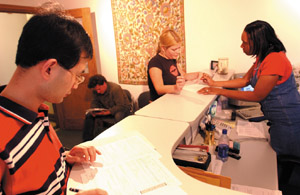 |
|
|||||||||
|
“On a day-to-day basis, this is pretty boring stuff,” says Felden, director of international affairs, a cheerful, middle-aged woman wearing a sea-foam green suit with a coral top and scarf. “But in the big picture there’s a hair-raising element of uncertainty.” It’s a Friday morning in early April, and in her sunny International House office she turns to her computer and navigates to the SEVIS log-in page. Above a sky-blue background a steel-gray banner bearing a ghosted American flag appears. “Warning,” the screen announces. “You have connected to a U.S. government computer. If you are not authorized to access this system, disconnect now.” Even for those, like Felden, authorized to access the system, SEVIS induces anxiety. While she dismisses horror stories of mysterious glitches leading to student arrests by the FBI as rare exceptions, she worries about international students complying with existing regulations, bewildering in their complexity, “within a new system that is rigorously inflexible because it is electronic and clumsy because it is untested.” This March the Department of Justice issued a damning review of the system for many reasons, including its inability to detect fraud. Although “we haven’t had a disaster yet” at Chicago, Felden says, that doesn’t mean one won’t occur. She calls up the record of a Taiwanese student transferring from another U.S. school, one of about 400 Chicago records manually entered into SEVIS by early April. Those students required special attention because of “reportable events” affecting their status—for instance, transferring schools, changing majors, or adding “practical training” (i.e., a job) to their stays. Chicago’s other 1,600 international students have been separated alphabetically to be entered into SEVIS over April, May, and June, giving the office a month of leeway before the final deadline. In theory at least, these should go much more quickly than inputting the students with reportable events because their records can be entered via batch-uploads from the fsaATLAS system, an international-student information system in use at Chicago for the past four years. In April, after devoting a staff member to the task full time since late fall, the University’s Networking Services and Information Technology department completed programming the interface for fsaATLAS and SEVIS for “batching.” But, Felden points out, it’s not unusual for SEVIS to be down for days at a time, making this “wonderful new capability kind of a moot point.” Before entry into SEVIS, each current student must meet with the international-affairs staff and provide updated information. Some requirements (permanent foreign addresses, for example) are new. Other updates have long been standard: for example, proof of financial ability to pay tuition and meet living expenses. The international-affairs staff typically completes 30 student entries a day, and the computers do the uploading overnight. A week or two later students can pick up their new I-20 forms, each bearing a unique bar code and file number. Also entered into SEVIS for next fall will be 650–700 new admits. Among that group, priority will be given to students from China—about 15 percent of Chicago’s international population—who have long had difficulty obtaining visas, and from 27 other, mostly Muslim countries requiring special screening since 9/11, about 9 percent. The process after students receive their I-20s from Chicago allows for tracking by the Department of Homeland Security: newly admitted students as well as those who have left the country temporarily sign and take the forms to the U.S. consular or embassy officer in their home countries to get a visa stamp. When the student arrives in the States, the immigration officer scans the bar code, pulls up the student’s record, and approves or denies entry. (Admission is not automatic once a visa is in hand.) “Already we have cases where students go to the embassy, and the officers there can’t access the system or find the student’s record,” says Felden. One Mexican student returned to the embassy five times before her record finally was found. As in the past, an applicant for a temporary (student) visa has to overcome the assumption of intent to stay permanently. “Students are guilty until proven innocent,” says Felden. And in the current climate, if there’s any doubt, “the default response is no.” Despite the glitchy, cumbersome process, international students’ interest in Chicago hasn’t flagged. This year, for example, the College’s greatest increase in applications—23 percent—came from overseas. Felden’s colleagues at other schools have similar reports. Still, she worries about the long-term effect of the “guilty until innocent” attitude.” The purpose of the Department of Homeland Security isn’t to promote international exchange,” she says with concern. “The government’s attitude is that everyone who enters this country is a potential terrorist. What will that mean for U.S. higher education 20 years from now? For us to be safe, we need others around the world to understand what makes us tick.” Meanwhile, Felden and her staff are doing everything they can to ensure that Chicago and its international students follow Homeland Security regulations to the letter. They’ll also do everything they can to smooth the new process, surveying this fall’s incoming international students about their experiences with the system. “In the past we knew how long the backlog would be. This system is so new,” Felden says, “we don’t know what kind of delays to tell students to expect.” That will have to wait until mid-October. —S.A.S.
|
|
Contact
|


